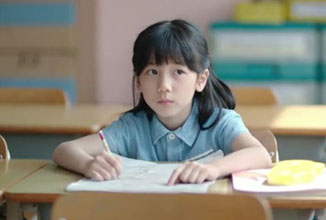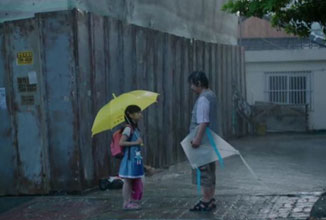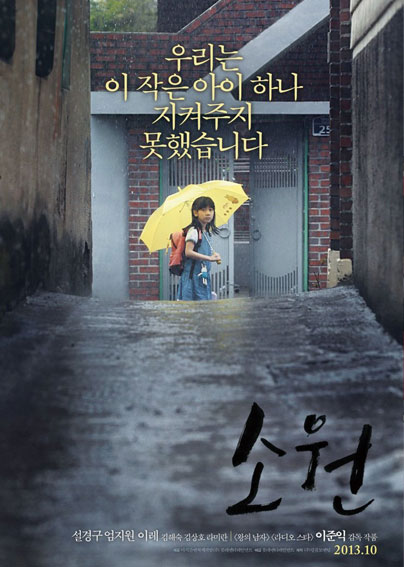"I thought you and mum might be busy... but the bad man should be caught... and I was really hurt... so, I just called 911, myself...
He was wearing beige pants and a vest with many pockets... the bad man... he really should be caught...
I was by the school...
I'm so sleepy, daddy, but what if I forget?"
Synopsis:
While walking to school on her own, eight-year-old Hope (Lee Re) is abducted, brutally beaten and raped. On being informed that she has been found near death at a construction site and taken to hospital, her parents - Mi-hee (Eom Ji-won) and Dong-hoon (Sol Kyung-gu) - rush to her side only to be informed by doctors that her single chance of survival is to undergo surgery to remove her intestines and fit her with a colostomy bag. In shock and utterly devastated, no sooner do Mi-hee and Dong-hoon agree to the surgery than thoughts of self-blame and the need for justice for their child begin to fill their minds but on talking further with the police they learn procedure dictates that Hope must give video testimony to identify the criminal before any further action can be taken to catch him.
However, in the course of their ensuing battle both with themselves and the authorities in tandem with their efforts to nurse their daughter back to health physically and psychologically, they soon come to realise that the hope that they desperately need is closer to hand than they could ever have imagined; coming equally from those around them and from the innocent little girl with the titular name...
In recent years, there have been a number of Korean films with synopses seemingly similar to 'Hope'; outwardly, at least. However, while most ('Don't Cry, Mommy'; 'Azooma', to name but two) have largely used the story of a child's abduction, violent abuse and rape as an admittedly often shocking narrative plot device for little other reason than to facilitate societal critique and commentary via dissection of a parent's battle for justice, closure and/or retribution in the face of bureaucracy and a largely uncaring world - more often than not, solely from that adult's perspective - few detail the victim's individual story to any great degree outside of its affect on others.
'Hope' does indeed use a similar (some might say overused) narrative premise as its basis but the fact that the film is based on a true story shows just how important it is to continue to talk about and make films detailing such difficult subjects, and in the process raise awareness of tragically shocking real life incidents that should never have been allowed to happen but which have continued to take place all too often, nonetheless.
‘Hope’ succeeds in bringing a freshness and even a palpable humanity to its heartbreaking proceedings by detailing our little heroine’s personal character journey towards recovery in a deeply touching manner with a depth at least equal to and perhaps even greater than that of her parents' character arcs; her ongoing story being vitally important not only to those around her but also to the very core of the film itself.
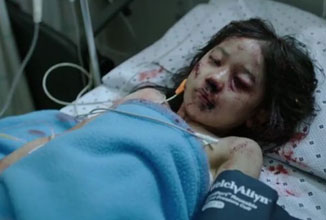 |
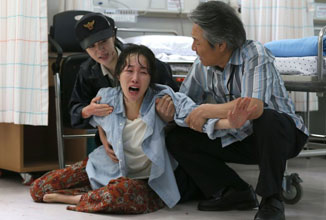 |
The film begins with a gentle almost uplifting piano melody accompanying visuals of a child's kite drifting through the air to finally land in a tree close to the local school and 'Hope's Variety' corner store; a small and homely retail establishment run by Mi-hee, Hope's mother and the wife of metalworker Dong-hoon. The early scenes following this intro while appearing somewhat as gentle social drama deftly and subtly tell us everything we need to know about the day-to-day lives of this average Korean family and all we must be aware of for the poignancy of the subsequent story to be fully realised: Mi-hee endlessly rushing around, often late and stressed; Dong-hoon overworked and under constant financial pressure; and Hope, feisty and intelligent beyond her years, easily able to cope with having to do things on her own as a result of her parents ever-hectic lives and happy to spend her time singing along to her favourite television cartoon, Kokomong.
Simple though these initial depictions seem and are, scratch the surface ever so slightly in hindsight and you'll find that hardly a moment passes that isn't vital to the later narrative, character arcs and underlying themes (such is also the case throughout the entirety of this utterly sublime film) and even the aforementioned passing kite reference has its part to play as the story begins to unfold and darken.
The heinous crime to which Hope is subjected is thankfully not shown - though we do see the little mite's blood soaked arm tentatively reaching for her phone after the end of the attack - but the aftermath of her fighting for her life in hospital is depicted in frankly brutal visual detail. While seeing an innocent child so badly beaten and fighting for her life is deeply moving and will undoubtedly bring viewer emotions and character empathy to the surface, it is Hope's first monologue in conversation with her distraught father that will break your heart, guaranteed, and from that moment on viewers will follow her story and every conversation with absolute inconsolable floods of tears. The quote at the very beginning of this review (prior to the synopsis) is taken directly from that monologue but though the dialogue is both touching and poignant, it is Lee Re's delivery that will ultimately tear you apart: A tiny, quivering voice beneath a breathing mask, a single tear forming at the corner of an eye desperately trying not to close and sleep, and heartfelt words showing an intelligence and thoughtfulness beyond this poor little girl's eight years sum up the heartbreaking perfection of this sublime film to a tee, again continuing each time the character details her thoughts and interacts with others.
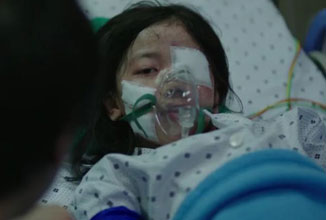 |
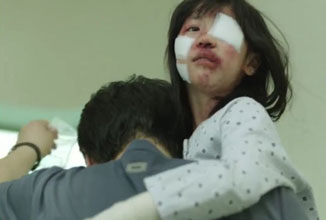 |
Up until shortly after this point, it is indeed true that the narrative and themes of 'Hope' have a number of similarities to the aforementioned 'Azooma', and the like - Hope's painful video testimony to police; her identification of the criminal and her father's efforts to discover who he is; the thematic search for justice in the face of bureaucratic procedure and red tape; etc etc - but subsequently, 'Hope' begins to unveil its far more humane agenda:
From here until around the halfway mark of the film, 'Hope' details the effect that the terrible incident has on the main and supporting characters from their individual perspectives and increasingly allows humanity to be underlined in each case - Mi-hee dealing with guilt and self-loathing having to learn to trust others she would normally have no time for, for the sake of her daughter; Dong-hoon facing endless financial worries relating to medical expenses, the constant brick wall he finds himself up against in his efforts to see justice done and his desperate need to find a way to reconnect with Hope following an unfortunate turn of events that causes her to shun and avoid being near him; and Hope, innocent little Hope, doing her best to recover physically but increasingly worrying about what others will say and how they will treat her as a result of such a terrible act that was neither her doing nor her fault.
While these emotional dissections continue for each character - individually and in relation to those around them - into the second half of the film, they subtly and increasingly become deeply uplifting in tone; all the while being contrasted with by a far darker, almost requiste yet necessary, criminal trial serving to lead 'Hope' towards its final culmination and conclusion. However, though this trial narrative plot element does also bear several similarities to ideas found in numerous films detailing court cases involving perpetrators of abuse against children, here too Lee Joon-ik brings an extra level of poignancy and meaning to proceedings by the deft inclusion of truly heartfelt emotional resonance provided via the character of Hope herself.
Dark and sombre though the majority of the above may sound, and is, director Lee Joon-ik expertly ensures that the uplifting nature of proceedings remains as a constant underscore through the remainder of the film, with gentle understated humour also playing a vital part; lightening proceedings temporarily as and when (and only when) it serves its greatest purpose. It is ultimately the combination of all these elements that allows the second half of 'Hope' to state its core themes and values:
For, what the film becomes is a dissection of the importance of family and community (themes hugely prevalent in Korean cinema from as far back as you care to look); a search that finds desperately needed hope not only within oneself and the actions of caring others but also in the heart of an innocent little child - a child called Hope.
Direction:
Director Lee Joon-ik is, of course, a veteran of the Korean cinema industry and as such it will come as little surprise that the direction of 'Hope' is confident, assured and of the highest quality throughout. Pacing is gentle but never drags nor rushes; tension building perfectly and at times almost imperceptibly, exactly as required. 'Hope' was made on a fairly low budget but not only is that not in any way detrimental to the story's realisation but, to my mind, actually makes the overall film stronger; allowing, as it does, focus to be centred on the character and narrative driven storyline, without pomp or ceremony.
Prior to 'Hope' in 2011, Lee Joon-ik announced that he was retiring from commercial filmmaking. I for one am eternally grateful that his return to the big screen was with a film as superb as 'Hope'. Not only has he returned to form and more, he has resolutely once more shown the talent we first saw in 'The King and the Clown'.
In short, we all have a heart; we all have emotions and hopes... I urge you with the utmost honesty and sincerity to see 'Hope', at any cost. Your heart and mind will thank you for it.
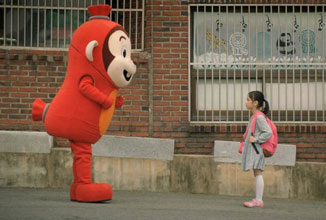 |
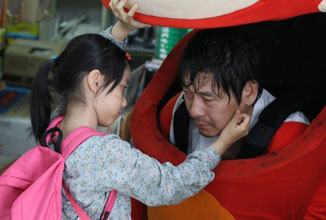 |
Cast:
The entire cast of 'Hope' give exemplary performances throughout the entirety of the film, with Sol Kyung-gu (as Dong-hoon) and Eom Ji-won (as Mi-hee) standing out among the adult actors and actresses. However, though not a criticism could be placed at either's door, Lee Re's performance as eight-year-old Hope frankly blows every other characterisation out of the water. I've spoken at length in numerous reviews about the sheer talent of Korean children in films over the years but I can, without hesitation, categorically state that Lee Re's portrayal of innocent victim Hope may very well be the best and most believable I have ever seen.
Lee Re's performance will single-handedly break your heart, and combined with 'Hope's' intelligent, poignant, nuanced and multi-layered narrative guarantees to both bring foods of tears to the eyes and remain in the mind long after the credits roll. Astounding and astonishing, period.
Directed by: Lee Joon-ik
Cast: Sol Kyung-gu, Eom Ji-won, Lee Re, Kim Hae-sook
Summary:
On the surface, the storyline of 'Hope' - detailing the aftermath of a young child's abduction, abuse and rape - bears a striking resemblance to a number of recent Korean box office thrillers, but delve just a little deeper and Lee Joon-ik’s sublime film quickly shows itself to be far more layered, nuanced and heartfelt than most. While 'Hope's' poignant tale will undoubtedly bring copious tears to the eyes of viewers, it is ultimately the astounding performance of child actress Lee Re as the titular character that will repeatedly break the heart, guaranteed.
Main trailer for 'Hope' (aka 'Wish'):
|


